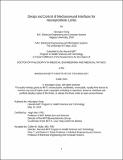Design and Control of Mechanoneural Interfaces for Neuroprosthetic Limbs
Author(s)
Song, Hyungeun
DownloadThesis PDF (5.631Mb)
Advisor
Herr, Hugh
Terms of use
Metadata
Show full item recordAbstract
Within the past two decades, numerous attempts have been made to fully reconstruct bionic gait via signals derived from the human nervous system. However, human gait has been difficult to emulate due to the high resolution of both efferent and afferent signaling required to replicate coordinated volitional and reflexive motor commands. Even invasive neural interfaces providing functional feedback from the bionic leg have been unable to demonstrate biomimetic gait. To compound the difficulty, there is limited understanding of the fundamental level of afferent feedback necessary to facilitate a high degree of neuroprosthetic integration for human locomotion.
In this thesis, we investigate the impact of preserving afferent feedback in residual limbs on the sensorimotor responses of individuals with below-knee amputations. Additionally, we present a neuroprosthetic framework that fully reconstructs biomimetic gait from neural information generated by individuals with below-knee amputation. We have achieved the level of neuroprosthetic integration necessary to execute versatile gait through a surgically-constructed mechanoneural interface that enhances native muscle afferents within the amputated residuum. Finally, we develop a myoneural actuator technology in a rodent model, enabling the design of a novel mechanoneural interface that allows for the direct modulation of proprioceptive afferents. These advancements have the potential to significantly improve the quality of life for individuals with amputations and further the development of advanced surgical and neuroprosthetic technologies.
Date issued
2023-06Department
Harvard-MIT Program in Health Sciences and TechnologyPublisher
Massachusetts Institute of Technology